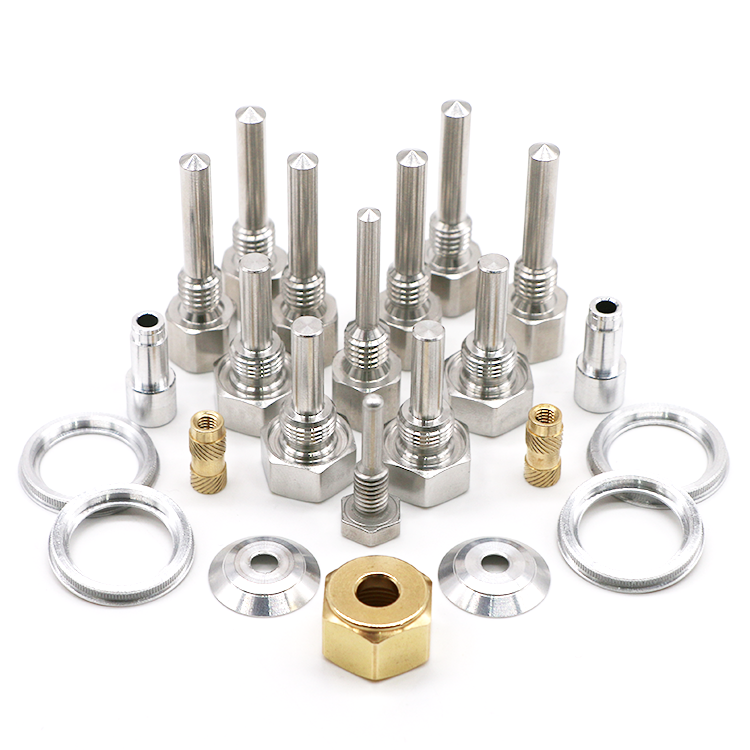Custom stainless steel industrial thermowell machining guide
The custom stainless steel industrial thermowell is used in conjunction with the thermocouple thermal resistance bimetal thermometer to protect the thermocouple thermal resistance bimetal thermometer from working normally. It can also be used in special occasions such as anti-corrosion, high pressure and high flow. (The company can also customize various special types of protective sleeves and flanges according to customers’ samples and drawings).
All designs refer to IEC standards. Blind hole processing, high pressure resistance. Equipment manufacturing and installation are carried out at the same time. Different pressure levels can meet different needs.
The protective tube, joints and locking bolts of the custom stainless steel thermowell type bimetal thermometer are all made of 1Cr18Ni9Ti material. The case is CNC turned into one piece, and the surface is treated with black electrophoresis. The cover shell is sealed and locked with an annular double-layer rubber ring thread. The structure is tight, and the overall instrument has good waterproof and anti-corrosion performance. The radius meter adopts the elbow structure, which is novel in shape, light and beautiful. Therefore, CNCMF leads everyone to understand the choice of custom stainless steel industrial thermowell .

What is a custom stainless steel industrial thermowell?
The custom stainless steel industrial thermowell is the thermal insulation element; the thermometer sleeve protects the stainless steel thermowell , isolates the process medium, and is easy to maintain. The sleeve is a separate device.
working principle
The bimetallic custom stainless steel industrial thermowell is a single-needle indicating thermometer with a bimetallic sheet wound into a spiral tube. One end is fixed, and the other free end is connected to the pointer. The pointer rotates as the temperature changes, driving the pointer to rotate to indicate the temperature.
Available metal materials for custom stainless steel industrial thermowell
Titanium (TB35)
Features: Resistant to low-temperature corrosion, especially seawater corrosion.
Nickel Copper Alloy (NCu)
Features: High strength, excellent corrosion resistance to alkali, non-oxidizing acid and salt water.
Low carbon steel (STPG)
Features: The oxidation resistance is weak, suitable for non-corrosive fluids. After surface modification with glass or resin, corrosion resistance can be improved.
Forged steel (SFVAF22)
Features: Low-carbon alloy steel has good corrosion resistance at high temperatures due to the addition of Mo and Cr.
Brass (C3601)
Features: Low temperature use, good processing performance.
Aoshi stainless steel (SS304/SS316/SS310S/SS321/SS347)
Features:
1. SS304 The most widely used stainless steel
2. SS316 is a pitting-resistant material, and the corrosion resistance of various media based on seawater is better than that of SS304.
3. SS310S has excellent oxidation resistance and is used as heat-resistant steel, but its resistance to vulcanization is poor.
4. SS321 is added with Ti, which has strong resistance to intergranular corrosion.
5. SS347 is added with Nb, which has strong resistance to intergranular corrosion.
Ferritic stainless steel (SUS329J1)
The two structures have strong acid resistance, pitting corrosion resistance and high strength.
Ferritic heat-resistant steel (SUH446)
High temperature corrosion resistance, iron sheet does not peel off at 1082℃, sulfur corrosion resistance.
Heat-resistant and corrosion-resistant alloy (NCF60/NCF80)
1. Excellent corrosion resistance under high temperature redox atmosphere. Strong resistance to carburization and nitriding.
2. Strong resistance to carburization and internal oxidation, stable austenite structure and good corrosion resistance. Its high temperature strength, creep and rupture strength are all high.
Cobalt-based heat and corrosion resistant compound (UMCO50)
Thermal shock resistance, wear-resistant materials, resistance to sulfide and vanadium corrosion, high temperature strength.
Wear-resistant alloy (HR1230)
It has extremely high strength and wear resistance, and is suitable for harsh wear environments such as fluidized beds.
Iron-based alloy (MPT-1/MPT-2)
1. Resistant to liquid corrosion of aluminum and aluminum alloys.
2. Resistant to fluorine cryolite corrosion.
Heat-resistant alloy tube (3YC52/OR1300)
The service temperature and high temperature oxidation resistance are better than similar high temperature alloys.
Summarize
The stainless steel industrial thermowell is an independent device of the heat preservation element. Choosing different materials will have different prices and costs. When using in what scene, you need to choose the right material.